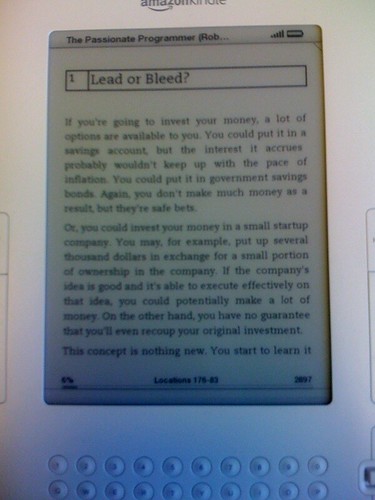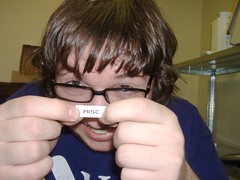What can we do right now?
Last month I picked up a new kindle from Amazon and have been reading a handful of books. One book that I’ve been really impressed with is Chad Fowler’s new book, The Passionate Programmer.
I plan to post some more thoughts in upcoming articles, but wanted to share this gem.
“If you treat your projects like a race, you’ll get to the end a lot faster than if you treat them like a prison cell. Create movement. Be the one who pushes. Don’t get comfortable. Always be the one to ask, “But what can we do right now?”” - Chad Fowler, The Passionate Programmer
Sometimes we feel stuck, but that doesn’t stop us from stepping to the side and assessing the situation. There is always something useful that we could be doing right now.
Embracing Failure, part 1
I’m currently reading To Engineer is Human, by Henry Petroski and found the following applicable to software development and managing client and customer expectations.
“As much as it is human to make mistakes, it is also human to want to avoid them. Murphy’s Law, holding that anything that can go wrong will, is not a law of nature but a joke. All the light bulbs that last until we tire of the lamp, all the shoelaces that outlast their shoes, all the automobiles that give trouble-free service until they are traded in have the last laugh on Murphy. Just as he will not outlive his law, so nothing manufactured can be or is expected to last forever. Once we recognize this elementary fact, the possibility of a machine or a building being as near to perfect for its designed lifetime as its creators may strive to be for theirs is not only a realistic goal but also a reasonable expectation for consumers. It is only when we set ourselves such an unrealistic goal as buying a shoelace that will never break, inventing a perpetual motion machine, or building a vehicle that will never break down that we appear to be fools and not rational beings.”
I’m sure that most of us are guilty of having high expectations for products that we purchased. (why does my ipod screen scratch so easily when in my pocket?) We also set high expectations for the code that we develop, which is why we (hopefully) continue to refine our process. We’re bound to time and budget constraints, which often prevent us from testing every imaginable edge case. Given our constraints, problems are almost always going to arise. It’s no wonder that we see Test-Driven Development as an important part of a healthy development process. We want to catch our failures as early as possible.
Our clients often have high expectations and it’s almost always very reasonable. That’s not to say that some clients will not have highly irrational expectations. It’s our job to manage these expectations as best as possible.
Do we mislead our clients by convincing them that our TDD/BDD process is going to prevent any bugs from creeping from the woodwork after the development cycle is finished?
“I thought that we paid you to fully test the code?”
Really… is that even possible? Can we predict (and test) every possible interaction within an application? Highly unlikely.
What we can do is plan for and embrace failure. We can help our clients understand that almost every application needs to be maintained after it’s initial development cycle. Bugs are inevitable and there needs to be a clear process for handling them.
Perhaps I’m abusing the bug fixing process by calling it a failure… but I’ve also found that yes… many bugs are due to failure. Whether that be a failure to specify application behavior, a failure to understand the project goals, a failure in communication, ...or maybe a failure in our software architecture. We’re constantly failing.. and it’s okay!
IT’S OKAY TO FAIL! (some of the time…)
“No one wants to learn by mistakes, but we cannot learn enough from successes to go beyond the state of the art. Contrary to their popular characterization as intellectual conservatives, engineers are really among the avant-garde. They are constantly seeking to employ new concepts to reduce the weigh and thus the cost of their structures, and they are constantly striving to do more with less so the resulting structure represents an efficient use of materials. The engineer always believes he is trying something without error, but the truth of the matter is that each new structure can be a new trial. In the meantime the layman, whose spokesman is often a poet or writer, can be threatened by both the failures and the successes. Such is the nature not only of science and engineering, but of all human endeavors.”
As we’re creating these virtual structures… are we really taking the time to reflect on our failures? This is why some teams adopt practices like iteration retrospectives and post-mortems.
I’ll end this with a few questions, which I hope that you’ll share your experiences about…
- In what ways is your team embracing the failures of your development projects?
- How do you help manage your clients expectations… so that they too can plan for and embrace failure? Isn’t their new business venture on the web… likely to experience some failure?
We have so much to learn…
Jeremy signs a book deal
Someone finally snatched him! Since Jeremy Voorhis started working with PLANET ARGON, he’s talked about how a few publishing companies had contacted him about writing a book on this new fancy web framework… Ruby on Rails. Due to being too busy with PLANET ARGON development projects... he would send them away. Yesterday, he announced that he recently signed a contract with O’Reilly to write Rails in a Nutshell.
Congratulations Jeremy!
...does this mean he isn’t as busy with development work? No… it just means he’ll sleep less in the next several months. ;-)
I'm leaving...on a jet plane...
I’m sitting at the Portland Airport with Jeremy… we have almost 2 hours to kill before our flight leaves. We love the free wifi at the PDX Airport. I took a few moments to upload some pictures to our flickr account and thought I’d take a moment to mention some cool news.
Jeremy Voorhis, Lead Architect at PLANET ARGON will be writing a book for O’Reilly. He mentioned it on his blog this morning it appears. :-)
Congrats Jeremy!
Keep your eyes on the Canada on Rails Flickr group!
The Book Business 2.0
1 comment Latest by dgibbons Fri, 31 Mar 2006 04:07:23 GMT
I saw David pointing this blog entry out to Jeremy.
Some interesting discussion/debate between DHH and Tim O’Reilly. :-)
Alpha reviewers selected
3 comments Latest by when1399@robbyonrails.com Wed, 15 Feb 2006 09:01:55 GMT
First of all… wow, I got a lot of responses.
I just sent the invites to the people that I selected… think I selected 7 out of the 46 people that responded.
:-)
Older posts: 1 2



